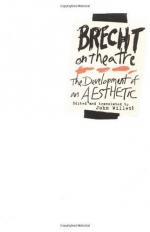
|
| Name: _________________________ | Period: ___________________ |
This test consists of 5 multiple choice questions, 5 short answer questions, and 10 short essay questions.
Multiple Choice Questions
1. Art, to Brecht, addresses all alike and would confront the tiger its _____.
(a) Song.
(b) Claws.
(c) Dance.
(d) Roar.
2. What is Brueghel's great war painting called?
(a) The Archangel Michael.
(b) The Conversion of Saul.
(c) Dulle Griet.
(d) The Fall of Icarus.
3. The rapid decline of artistic methods under the Nazis seemed to Brecht to have take place _____.
(a) Unnoticed.
(b) As a result of bombings.
(c) Under scrutiny.
(d) In Berlin only.
4. Who was in charge of Das Wort?
(a) Scher.
(b) Bredel.
(c) Neher.
(d) Brecht.
5. What signified a broad flow of popular musical elements into modern music?
(a) Blues.
(b) Avant-garde.
(c) New Age.
(d) Jazz.
Short Answer Questions
1. Length of scene was settled during _____.
2. When asked if Katzgraben is a play with a message, Brecht replies that _____ is a play with a message.
3. Getting louder when increasing_____ is one of Brechts 'common tendencies for actors to guard against'.
4. The actor first masters his character by mastering the _____.
5. An artist from _____ made sketches for Laughton of Galileo.
Short Essay Questions
1. Why did the actors sit openly on the stage in Neher's production of Antigone?
2. What are the conventions of traditional verse and how does Brecht's poetry defy these conventions?
3. How did Neher and Brecht agree and disagree with Aristotle in the style of presentation of Antigone?
4. What does Brecht see as the reasons for lifeless and stereotyped portrayals of characters by actors?
5. What is the role of the story in theatre?
6. How does Brecht say that the new sciences affect humanity?
7. What does Brecht see as a good way of judging gestic music with a piece of text?
8. What does theatre show us about the structure of society and how is this represented?
9. What is Brecht's view on run-throughs?
10. What is Brecht's view on rehearsal of details?
|
This section contains 655 words (approx. 3 pages at 300 words per page) |

|




